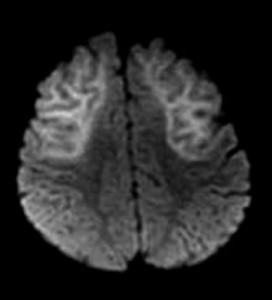Genetic basis of acute encephalopathy after prolonged febrile seizures Polymorphism of adenosine A2A receptor gene


© Masashi Mizuguchi. Cranial MRI (diffusion-weighted imaging) of acute encephalopathy with biphasic seizures and late reduced diffusion (AESD). Three to five days after its onset with febrile status epilepticus, lesions of high signal intensity appear in the cerebral subcortical white matter. In this patient, lesions were noted in the bilateral frontal lobes.
A research group led by Professor Masashi Mizuguchi and Doctor Makiko Saitoh (Graduate School of Medicine, the University of Tokyo) demonstrated that polymorphism of the adenosine A2A receptor (ADORA2A) gene is a risk factor of acute encephalopathy with biphasic seizures and late reduced diffusion (AESD), a syndrome prevalent among Japanese children that begins with febrile status epilepticus, followed by impairment of consciousness, and then by intellectual deficits, motor paralysis, epilepsy and other sequelae. Immediately after its onset, few good diagnostic and therapeutic means are currently available. Adenosine is a signal molecule that binds to multiple receptors and regulates cellular functions. There are in the brain A1 and A2A receptors, which exert excitatory and inhibitory functions respectively. This study demonstrated an excessive A2A function in AESD, identifying the adenosine signaling system as a therapeutic target in the development of novel drug therapy of AESD.
Press release (Japanese)
Paper
Mayu Shinohara, Makiko Saitoh, Daisuke Nishizawa, Kazutaka Ikeda, Shinichi Hirose, Junichi Takanashi, Junko Takita, Kenjiro Kikuchi, Masaya Kubota, Gaku Yamanaka, Takashi Shiihara, Akira Kumakura, Masahiro Kikuchi, Mitsuo Toyoshima, Tomohide Goto, Hideo Yamanouchi, Masashi Mizuguchi,
ADORA2A polymorphism predisposes children to encephalopathy with febrile status epilepticus.
Neurology Online Edition: 2013/3/27 doi: 10.1212/WNL.0b013e31828f18d8.
Article link







